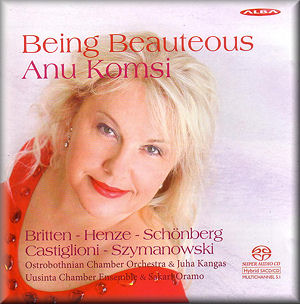 |
 |
|


alternatively
CD: MDT
AmazonUK
Sound
Samples & Downloads |
Being Beauteous
Benjamin BRITTEN (1913-1976)
Les Illuminations (1939) [23:19]
Hans Werner HENZE (b. 1926)
Being Beauteous (1963) [14:45]
Arnold SCHOENBERG (1874-1951)
Herzgewächse, Op. 20 (1911) [3:03]
Niccolò CASTIGLIONI (1932-1996)
Terzina (1992) [5:16]
Karol SZYMANOWSKI (1882-1937)
Slopiewnie, Op. 46b (1921) [10:58]
 Anu Komsi (soprano)
Anu Komsi (soprano)
Ostrobothnian Chamber Orchestra/Juha Kangas (Britten)
Uusinta Chamber Ensemble/Sakari Oramo (the rest)
rec. 27-28 May 2011, Sello Hall, Espoo, Finland (Britten) and 28-30
October 2010, Snellman Hall, Kokkola, Finland (the rest)
Sung texts and English translations provided
 ALBA ABCD331
ALBA ABCD331  [58:15]
[58:15]
|
|
|
Hot on the heels of Anne-Catherine Gillet’s performance of
Les Illuminations (review)
comes another, quite different one from the Finnish coloratura
soprano Anu Komsi. My suspicion that Britten wasn’t totally
in sympathy with Rimbaud’s poetry is unsupported by documentary
evidence, but in my own case there is no doubt: Rimbaud prevents
me from fully appreciating the work. This performance has come
as close as any to convincing me, however. The opening is crucial.
The title is “Fanfare”; that is just what the strings should
deliver, and my goodness, they certainly do. Anu Komsi’s is
a big voice, easily capable of reaching the farthest corners
of those opera houses that are her regular venues, and she uses
it to dramatic effect in the “motto” at the end of “Fanfare”.
Then follows “Villes”, very fast and aggressively dramatic.
The performers are scrupulous about observing fortissimo
markings; it sometimes makes for unpleasant listening, and in
spite of the remarkably successful opening I was getting ready
to dislike this performance. How wrong one can be! In the following
“Phrase” Anu Komsi tones down her voice to exquisite effect,
and ends with a stunningly ppp high B flat, followed
by the slowest, most brilliantly controlled downward glissando
you can imagine. Her singing of “Antique” is most persuasive,
and the two short, faster songs that follow are brilliantly
done. She has a very individual way with some phrases, and I
rather think that Britten, who was notoriously fussy about how
he felt his music should go, would have been resistant to this.
The song that gives the disc its title is taken very slowly
indeed, adding a full minute to Britten’s own timing, with Peter
Pears, of four minutes. But it is very convincing, and the final
song is most movingly sung. In short, this is a magnificent
performance, but perhaps a challenging one for those who already
know how they want the music to go.
Britten’s setting of “Being Beauteous” runs for no more than
five minutes, whereas Hans Werner Henze manages to spin it out
for nearly a quarter of an hour. The work is scored for soprano,
four cellos and harp, so performances are surely rare. It’s
a pity, as there are many ravishing sounds in it, and the vocal
writing, vertiginously high at times, is masterly. If any listener
still harbours doubts about Anu Komsi’s ability to put her voice
at the service of the music, they will be stilled by this performance.
Her pianissimo singing is exquisite, her assumption
of the solo part at once technically assured and deeply seductive.
A rival performance on DG is conducted by the composer. The
work is treated more dramatically than here, but Edda Moser,
though deeply convincing, cannot rival Anu Komsi in sheer beauty
of tone.
Schoenberg’s name on a CD cover is still enough to discourage
many people, but in this case it shouldn’t, as the work, only
three minutes in duration, is a fascinating one. New to me,
and hardly ever performed, this short work reveals the composer’s
ear for beauty – yes, beauty! – as well as his undeniably vivid
response to Maurice Maeterlinck’s virtually untranslatable (incomprehensible?)
poem. The performance is remarkable, the singer demonstrating
formidable vocal control in registers higher than many sopranos
would be able to sing at all.
The translation-heavy notes by the singer herself don’t cast
much light on Castiglioni’s Terzina. This short setting
of an eighteenth-century mystic/sacred text is accompanied by
an eight-piece instrumental ensemble that includes some percussion.
The music is so slow as to be almost static, very spare, the
language advanced yet accessible, putting this listener in mind
of Webern.
This is all very fine indeed, and would already constitute a
most satisfying, if short, CD. The best is yet to come, however,
for the Szymanowski – the title translates as The Cherry
Trees – is a minor masterpiece. In this cycle of five short
songs for soprano and chamber ensemble the composer evokes in
turn, with extraordinary economy and uncanny vividness, a nightingale
singing on a hot spring night; a foal skipping by a spring;
a choir of angels singing in praise of Saint Francis; the redness
of sorcery, love and death; and, to close, the waters of the
Vistula washing through the hair of a drowned princess. This
is music of the utmost sensuousness, deeply affected by folk
traditions yet clearly of the twentieth century. The vocal writing
is challenging, but this remarkable singer takes everything
in her stride. (Beware two blood-curdling exclamations!) It
is impossible to imagine this deeply impressive short work better
done.
The Britten is accompanied by the Ostrobothnian Chamber Orchestra,
whose playing is just as brilliant as it was on their outstanding
disc, Fiddler’s Spring, also on Alba, that I reviewed
recently. The instrumental accompaniment to the other works
is no less masterly.
Superbly recorded, this is an unusual programme that will bring
enormous pleasure and satisfaction.
William Hedley
|
|















